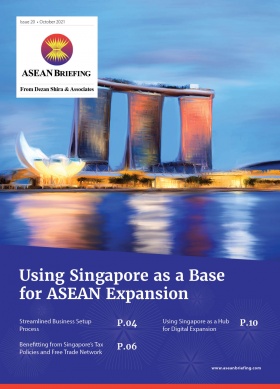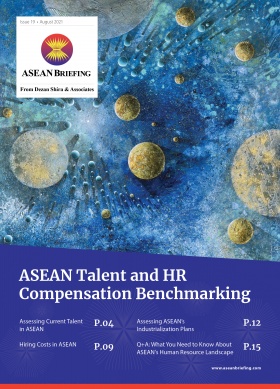New Requirements for MSME Franchise Holders in the Philippines
The Philippines issued executive order (EO) 169 to create competitive conditions for micro, small, and medium-sized enterprises (MSME) franchisees in the country. EO 169 sets out the terms and conditions of franchise agreements with MSME franchisees and requires franchise holders to register with the Department of Trade and Industry (DTI) – if they have a franchise agreement with an MSME franchisee. The DTI will monitor their adherence to the terms and conditions laid out in the franchise agreement and check for the provision of remedies if any party is in breach of the contract.
In May 2022, President Duterte signed and issued executive order (EO) 169 which aims to strengthen the Philippines’ franchising sector and protect micro, small, and medium-sized enterprises (MSMEs) by promoting an equitable and business-friendly environment.
Under EO 169, franchise holders of MSMEs are now required to have franchise agreements registered with the Department of Trade and Industry (DTI), and all future agreements are to be in line with the required terms and conditions set out in EO 169.
Further, the DTI will create an MSME registry of franchise agreements with its role to track the terms and conditions of franchise agreements, and the remedies if any party is in breach of the agreement.MSMEs in the Philippines are defined as businesses that employ between 10 to 200 workers and have asset sizes (excluding land) between PHP 3 million (US$56354) and PHP 10 million (US$187,866).
Who must register with the DTI?
Franchisors are responsible for registering their franchise agreements with the DTI, provided that the franchisors are members of registered franchise associations. Moreover, the franchisors are to execute an undertaking that all future agreements with MSME franchisees shall incorporate the terms and conditions under EO 169.
The minimum terms and conditions of franchise agreements with MSME franchisees are as follows:
- The name and description of the products and services under the franchise;
- Details of the responsibilities of the franchisor;
- Detailed responsibilities of the MSME franchisee;
- Details of the specific rights granted to the MSME franchisee, such as intellectual property rights;
- Details of any pre-signing, or recurring fees, such as franchise fees that are imposed on the MSME franchisee;
- Duration of the franchise agreement and the terms and conditions for renewal;
- Provision of ‘cooling off’ period where the MSME is given the option to terminate the agreement;
- Details of the mechanism to resolve disputes;
- Non-discrimination provisions;
- The mechanism for when either party breaches the terms and conditions of the franchise agreement; and
- Effects of and grounds for pre-termination, termination, or expiration of the franchise agreement.
The DTI has been tasked to provide incentives and other benefits to franchisors who include the mentioned terms and conditions in their franchise agreements. Further, although the inclusion of these terms and conditions is not mandatory for non-MSME franchisees, franchisors can use them as best practice clauses for their own franchise agreements.
Franchisors that are not members of any registered franchise associations must register all their franchise agreements entered into with MSME franchisees.
Creation of an MSME registry of franchise agreements
The DTI will create an MSME registry of franchise agreements. Only franchise agreements between a franchisor and an MSME franchisee may be registered in the said registry.
Importance of MSMEs in the Philippines
MSMEs are the backbone of the economies in Asia, and more so in the Philippines where they represent 99 percent of businesses in the country. They contribute to 25 percent of the Philippines’ total exports, employ some two-thirds of the workforce, and contribute 40 percent of the country’s GDP. As such, strengthening and improving the business environment for Filipino MSMEs will be crucial to not only post-pandemic growth but also inclusive growth.
However, MSMEs add relatively low value to the Philippines’ economy – the lack of access to financing being their most serious growth constraint. Despite the government making funds available, many MSMEs have limited collateral and credit history to qualify for them and so rely on informal banking solutions to obtain financial support.
A huge advantage for franchisors in working with an MSME franchisee in the Philippines is that local MSMEs have economic activities in regions all over the country, and not just in the major cities.
Further, with the help of technology, MSMEs in the Philippines are now capable of serving customers worldwide. Presently, this potential is largely untapped, particularly in getting MSMEs to take advantage of the country’s preferential trade agreements.Among the free trade agreements that the Philippines is a party to is the Regional Comprehensive Economic Partnership (RCEP). Local MSME exporters can better comply with the RCEP’s rules of origin requirements and begin exporting their products and services to other member markets under mostly duty-free treatment.
Further Reading
- What a Ferdinand Marcos Jr Presidency Will Mean for Foreign Investors in Philippines
- The Philippines Amends its Foreign Investment Act
- Philippines Senate Passes Bill Allowing 100 Percent Foreign Ownership of Public Services
About Us
ASEAN Briefing is produced by Dezan Shira & Associates. The firm assists foreign investors throughout Asia and maintains offices throughout ASEAN, including in Singapore, Hanoi, Ho Chi Minh City, and Da Nang in Vietnam, Munich, and Essen in Germany, Boston, and Salt Lake City in the United States, Milan, Conegliano, and Udine in Italy, in addition to Jakarta, and Batam in Indonesia. We also have partner firms in Malaysia, Bangladesh, the Philippines, and Thailand as well as our practices in China and India. Please contact us at asia@dezshira.com or visit our website at www.dezshira.com.
- Previous Article Singapore Signs Digital Trade Deal With the UK
- Next Article Cambodia’s Law on Investment: What Foreign Investors Need to Know







